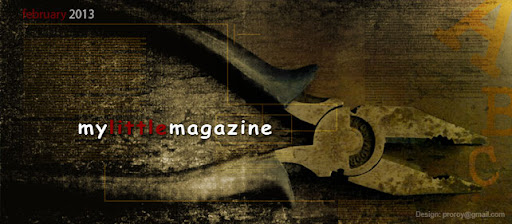By Bina Biswas
Hyderabad, India
Shortly after their return from Karwar, Tagore was married. In early September of 1883, Tagore received a letter from his father, who was then in the hills of Shimla to see him at once. The letter was served as a summon and what transpired, nobody knows, within three weeks, Tagore was married on 09 December 1883. The marriage was a very plain affair and was held at Jorasanko and not at the bride’s place. Bhabatarini, the daughter of an employee on the Tagore estates, was ten years old, quite thin, not good looking and almost illiterate. Tagore appears to have accepted his father’s choice without meeting her. Her name was later changed to Mrinalini/“Lotus-like” and was dispatched from Jorasanko to stay in central Calcutta with her much older sister-in-law Jnanadanandini. The idea was that she should start to be educated; she was even sent ‘Loreto House’ a well known convent. Tagore would have seen his wife at his sister-in-law’s house, where he was spending more and more time.

Before his marriage, he wrote some poems and published them on 23 February in 1884 as Chhabi O Gaan/“Pictures and Songs”. These he dedicated to Kadambari. One of them was particularly striking, entitled Rahur Prem/“The love of Rahu”. It concerned a Rahu, a popular demon in Hindu mythology. The myth of Rahu is recounted in the Mahabharata (Adi Parva, Ch.19). After the gods and demons had churned the ocean and drawn from it the nectar of immortality (amrita), Vishnu secured the nectar for the gods. But the demon Rahu sat down in disguise at the gods’ feast to drink it. He was detected by the Sun-god and the moon-god, and decapitated by Vishnu. The demon’s severed head was henceforth called Rahu and his body Ketu. Since the nectar had reached the demon’s throat, Rahu was immortal. Angered with Sun and the Moon for having exposed him, Rahu tries continually to devour them, but they escape out of his severed gullet. Solar and lunar eclipses are explained in this way; and because of their inauspicious associations, “to be devoured by Rahu” has become an idiom of misfortune or evil influence. In this poem, Tagore applies the Rahu myth to the context of self-centred, destructive, all-devouring love. The parallel with sexual desire is obvious. Here is a paraphrase of the poem in which Rahu speaks:
Hyderabad, India
Kadambari Debi, Tagore’s elder sister-in-law exercised a deeper authority than even her husband, Jyotirindro and was a dear friend of the poet. After the death of the poet’s mother in 1875 she was something of a guide to the young boy; she made him her playfellow in her girlish pastimes, and when Tagore budded into a poet, she was his discerning critic. She would subject all that Tagore wrote to severe examination and saved him from vanity and self-criticism.

Before his marriage, he wrote some poems and published them on 23 February in 1884 as Chhabi O Gaan/“Pictures and Songs”. These he dedicated to Kadambari. One of them was particularly striking, entitled Rahur Prem/“The love of Rahu”. It concerned a Rahu, a popular demon in Hindu mythology. The myth of Rahu is recounted in the Mahabharata (Adi Parva, Ch.19). After the gods and demons had churned the ocean and drawn from it the nectar of immortality (amrita), Vishnu secured the nectar for the gods. But the demon Rahu sat down in disguise at the gods’ feast to drink it. He was detected by the Sun-god and the moon-god, and decapitated by Vishnu. The demon’s severed head was henceforth called Rahu and his body Ketu. Since the nectar had reached the demon’s throat, Rahu was immortal. Angered with Sun and the Moon for having exposed him, Rahu tries continually to devour them, but they escape out of his severed gullet. Solar and lunar eclipses are explained in this way; and because of their inauspicious associations, “to be devoured by Rahu” has become an idiom of misfortune or evil influence. In this poem, Tagore applies the Rahu myth to the context of self-centred, destructive, all-devouring love. The parallel with sexual desire is obvious. Here is a paraphrase of the poem in which Rahu speaks:
I am your companion from the beginning of time, for I am your own shadow. In your laughter, in your tears, you shall sense my dark self hovering near you, now in front, now behind. At the dead of night when you are lonely and dejected, you’ll be startled to find how near I am seated by you, gazing into your face.
Whenever you turn I am here, my shadow sweeps over the sky and covers the earth, my piteous cry and my cruel laughter echo everywhere, for I am hunger never appeased, thirst never quenched. I am always there, a dagger in your breast, a poison in your mind, a disease in your body.
I shall chase you like a terror in the day, like a nightmare in the night. Like a living skeleton in a famine I shall stretch my hand before you and pester you to give and give and give. Like a thorn I shall prick you day and night, like a curse shall I haunt you, like fate I shall follow you – as night follows day, as fear follows hope.
(Rahur Prem/“The love of Rahu”)
Two months after publication, Kadambari committed suicide, aged about twenty-five. For Tagore Kadambari’s death was the first of a person he deeply cared for. Over the years death would become his constant companion. This poem and the death that followed in the family after it was published are important since Tagore learnt to accept death as the ultimate truth. Years later in Chhabi/“Picture” he was to offer a remarkable tribute to her, the poet within a poet’s heart.
Perhaps, nothing is more precious in human life than love, the intense obsession a man and a woman feel for each other. With extraordinary intricacy Tagore analyses its different moods and recaptures the passion lovers feel for each other. An examination of his poems shows the originality of his perception and the delicate art with which he portrays the minute shades of passion.
Tagore was insensitive to Kadambari's feelings...he named her 'Hectate' and went to dedicate his poems to her..despite malicious whispers and raised eyebrows of the family members...after his marriage he dedicated "Rahur Prem" to her...in which everything was symbolic...and result was shattering for a 25year old woman...who committed suicide by consuming an over dose of opium....











